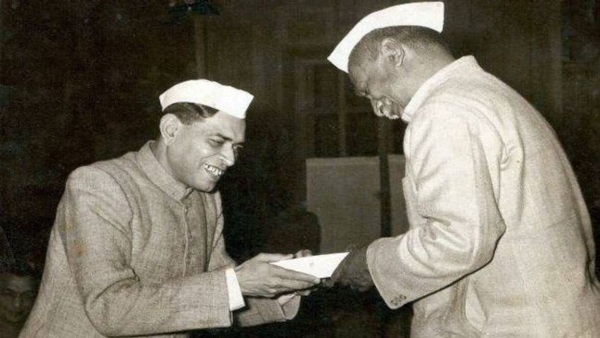Remembering Rashtrakavi Ramdhari Singh Dinkar with his 5 legendary works
23 Sep 2022 14:56:17
Greatest Poet of Veer Rasa after Kavi Bhushan, Ramdhari Singh Dinkar , has penned down some 'all time relatable' poetry, with him and his work leaving infinite impact on the Indian society. Going beyond the sole purpose of poetry; of expressing human emotions, Ramdhari Singh Dinkar's poetry reflects his consciousness of the contmporary Indian society and an understanding of the role of socio - political consciousness as a significant characteristic of literature. On his birth anniversary, here are 5 proses of Dinkar's poems that Indians can relate to even today;

1. Jantantra ka Janm
“आरती लिये तू किसे ढूंढता है मूरख, मन्दिरों, राजप्रासादों में, तहखानों में? देवता कहीं सड़कों पर गिट्टी तोड़ रहे, देवता मिलेंगे खेतों में, खलिहानों में।”
In his poem 'Jantantra ka Janm', that was part of his poetic compilation 'Neel ki Kusum' published in 1955, Dinkar quite impactfully and creatively explains how India has awakened after centuries of monarchical rule to the worth of self rule. In these lines, Dinkar explains how Indians had become used to the habit of feeling inferior to someone and that how they looked up to someone authoritative and that now (1955) the time has finally come when Indians have realized that true power resides by their side and the significance of an individual in a democracy. The entire poem speaks volumes about the Psychological impact of 'Monarchy' on several generations of the country, honestly, to which we are struggling even today.
2. Sanskar
“जब डंकों के बदले न डंक हम दे सकते, इनके अपने विश्वास मूक हो जाते हैं, काटता, असल में, प्रेत इन्हें अपने मन का, मेरी निर्विषता से नाहक घबराते हैं।”
'Sanskar' is another poem from the same compilation 'Neel ki Kusum' published in 1955. The poem deals with the most basic thread of humanity in the society and talks about the culture of the entire human society and not the Indian society in particular. The poem portrays Dinkar's undivided and compact visualization of the world as a place that belongs to all humans and at such a place where humans have been residing since forever, how have we been treating each other, naturally. The poem disects human nature in general and makes one indulge in self introspection.
3. Chaand aur Kavi
“"रात यों कहने लगा मुझसे गगन का चाँद, आदमी भी क्या अनोखा जीव होता है! उलझनें अपनी बनाकर आप ही फँसता, और फिर बेचैन हो जगता, न सोता है।"”
A typical poet, will have at least one poem penned down that he has drawn inspiration for from the moon. And yes these poems of moon are usually penned down for the first time at the most earlier phases of any poet. Ramdhari Singh Dinkar's 'Chaand aur Kavi' is another poem from 'Neel ki Kusum' which takes readers on a lively journey of the philosophical relationship every poet shares with the moon.
4. Pataliputra ki Ganga Se
“"घूम रहा पलकों के भीतर स्वप्नों-सा गत विभव विराट्? आता है क्या याद मगध का सुरसरि! वह अशोक सम्राट्?”
“ संन्यासिनी-समान विजन में धर अतीत गौरव का ध्यान, रो-रोकर गा रही देवि! क्या गुप्त-वंश का गरिमा-गान?" ”
Indian history might be complicated with so many dynasties ruling at so many places contemporarily but turn it into a poem and there are high chances that one might actually be interested to learn it. Ramdhari Singh Dinkar's 'Pataliputra ki Ganga Se' is from his compilation 'Itihas ke Aansu' published in 1951, where he perfectly managed to fit the entire chronology of events that have taken place along the mighty river Ganga, in Pataliputra, that resembles today's Bihar and has been an important city ever since the age of Mahajanapadas, when it was the capital of Magadha. With a lineage of several dynasties and rulers, the river has been a witness to several ideologies that have shaped the philosophy and culture of India.
5. Himalaya
“"सुखसिंधु, पंचनद, ब्रह्मपुत्र, गंगा, यमुना की अमिय-धार जिस पुण्यभूमि की ओर बही तेरी विगलित करुणा उदार,"”
One of his older compositions, 'Himalaya' was published in his poetic compilation 'Hahakar' in 1938. There is no Indian who is not proud of the Himalayas. Although there are several countries that surround the Himalayas, the belongingness that India shares with the Himalayas is hard to be found anywhere else. That is because, Himalayas have provided the people of India with a natural shelter and protected the Indian land from not just manly attacks but also from harsh weather of Central Asia.
Besides, India is blessed with several rivers. The Indian civilization has bloomed along these rivers. These rivers too have been a blessing of the Himalayas where most of these rivers orginate. This reasonable sense of belongingness to the Himalayas that every Indian shares is vividly experienced in the poem.
--
